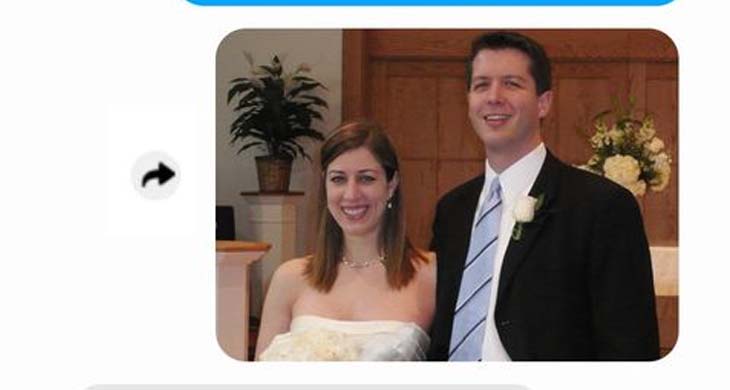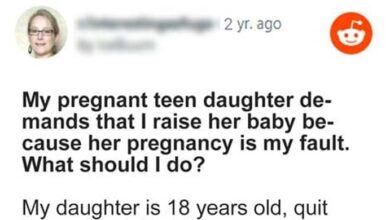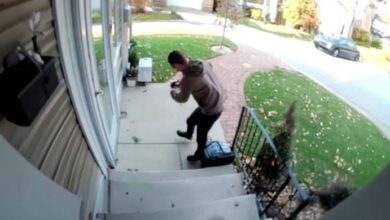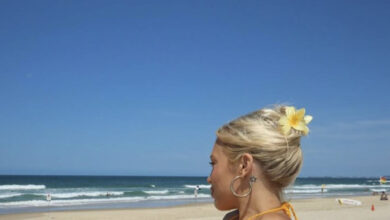My Husband Said That His Ex Wife Died Years Ago, Today She Messaged Me on Facebook

Before Maisie married Daniel, he told her that his ex-wife had died. But one evening, Maisie stumbles upon Laura’s active Facebook profile. One thing leads to another and Laura leaks information that shatters Maisie’s entire life. She’s left wanting to confront Daniel and take him for everything he has.
The art world—that’s where I first met Daniel. I was a new and upcoming artist who was only entering the gallery and exhibition world now.
I didn’t know where to begin navigating such a world.
And then I met Daniel—the owner of a popular gallery that focused on artists that were new to the scene
“I’m Daniel,” he said, introducing himself when I walked into the gallery one afternoon.
“Maisie,” I said, taken by his looks and the charm that oozed from him.
After an hour of me explaining my art and concepts to Daniel, he asked me out to dinner.
“Just so that we can talk more,” he said. “But I think your art will find a home here, at my gallery.”
A few weeks after our initial meeting, Daniel set up the perfect opening night for me.
“It’s your debut into this world, Maisie,” he said, taking my hand and making his intentions over.
I remember looking at the paint on my sneakers and under my nails, and wondering what on earth he saw in me.
But when Daniel looked at me, I felt seen. My art felt seen, and I found that I always had inspiration to paint.
A year later, Daniel proposed to me in the gallery, while I was painting in one of the back rooms.
“You’re everything I’ve ever wanted,” he said. “This is it, Maisie.”
Of course, I wanted what he wanted. I wanted the life that Daniel had told me about—traveling to museums around the world, visiting exhibitions, and learning everything I could about art history.
He created a world that I wanted to live in. A world that I wanted to exist in—with him.
One evening, a few weeks before we got married, Daniel and I were sitting in my living room. He confessed to being married before.
“Maisie,” he said slowly. “I was married before; it wasn’t for long.”
“Then what happened?” I asked, pouring us some wine. For some reason, I felt that the story had to be heavy if Daniel hadn’t mentioned it for so long.
“She died,” he said, his eyes fixed on the carpet.
“Oh, Daniel,” I said, reaching out to touch him. Everything in me screamed out to comfort him.
“I’m so sorry,” I said.
He sat back, holding the glass of wine, and told me about Laura, his first wife.
“She just got sick, you know?” he said. “And then her body couldn’t take it anymore. She was in and out of the hospital, too. One day, it was all over.”
I sat across from Daniel; I didn’t know what to say or do. So, I just sat in silence.
We got married shortly after, and Daniel continued to represent me and my art.
When we had my second show at the gallery, Daniel spoke eloquently about supporting emerging talents and securing their works’ financial appreciation.
That is why I trusted him completely when he suggested handling my finances too, citing his expertise in investments within the art market.
Our marriage, much like a well-curated exhibition, was meticulously arranged to showcase a perfect partnership.
Little did I know that the illusion was about to crumble.
Daniel had an exhibit for the evening, leaving me to a welcome solitude.
I sat drinking my glass of wine as I scrolled through Facebook, looking at the recommended friend suggestions—something that I always found myself doing absentmindedly.
There, I stumbled upon his late wife’s active Facebook profile. That flicker of digital activity—”Online Now”—sent a cold wave of doubt crashing over me. Compelled by a mix of fear and curiosity, I messaged her, half expecting no reply.
She was, as I had been told, dead.
But her response was immediate and terrifying:
Maisie, I’ve been watching you. You need to leave Daniel. Protect your assets and run.
The absurdity of receiving such a warning from someone I believed to be dead set my world spinning.
And yet, the truth was that Daniel had crafted a narrative of a widowhood marked by loss and financial savvy, making it seem natural for him to manage the money matters in our relationship, just as he expertly managed his gallery.
I sat in front of my laptop for hours, while Laura explained how Daniel had done the same thing to her. The story was almost identical to mine—a young artist meets a successful gallery owner.
As Laura revealed more, it turned out that the gallery was more than just a space for art—it was a front for his schemes.
My husband wooed artists, promising them exposure and success. He sold their works for high sums to elite clients but reported back significantly lower sales figures, pocketing the difference.
When artists questioned the discrepancies, they were met with complex financial statements and promises of future exhibitions that would supposedly recoup their losses.
I sat back, trying to decide whether I had been a victim of Daniel’s schemes, too. He had lied about Laura—he preferred to say that he was dead, rather than admitting that she had left him when she found out what was going on.
The more I thought about it, the more it made sense.
There were many artworks of mine which had sold immediately, but the money that I received was less than half of it.
I couldn’t understand the reason—but I just assumed that it was the business. The arts were unpredictable.
Immediately, I logged onto my banking app and transferred all my savings to a secure account.
I took a shower, trying to calm myself down before Daniel got home. Reading Laura’s messages had sent me into a panic—I didn’t want to believe her. But at the same time, things added up. It made sense to me.
Now, when I thought about Daniel, I would only see a man who lied about his ex-wife.
As I was getting into bed, Daniel walked in.
“Honey,” he said, coming into our bedroom and undressing.
“How was the opening?” I asked him, watching his expression.
“It was good, a nice turnout,” he said, yawning. “The show should be lucrative on the whole.”
My husband got into bed and promptly fell asleep.
I couldn’t sleep at all. There was nothing good about the situation.
I felt fear.
I waited until Daniel left for the gallery the next morning.
“What are you doing today?” he asked me as he drank his coffee before leaving.
“I’m going to paint,” I said, as I made myself some breakfast.
I wasn’t hungry, but I needed something to do.
“Make me masterpieces, darling,” he said as he put his mug into the sink and ran out.
Later, I left him a note on our shared studio table, surrounded by the vibrant chaos of unsold paintings and sculptures—a stark contrast to the clear, final words I wrote.
I told him that I had spoken to Laura and that I knew everything.
The illusion of our marriage is over, Daniel.
I packed most of my belongings and left for my parents.
A few days after I had settled down, I met Laura at a café. We sat and pieced together evidence of Daniel’s fraud, each of us painting a picture of the man behind the gallery’s facade.
“We can find some of the other artists, too,” Laura said as she broke a piece of her muffin.
“I remember some of them,” I said. “It won’t be difficult to trace them.”
In the end, we pursued legal action, not just for the return of stolen earnings but to protect future artists from Daniel’s predatory tactics. The process was cathartic, transforming our shared pain into a powerful narrative of justice and solidarity.
I don’t think I’ve grieved the end of my marriage yet, but I am grateful to be rid of a man who didn’t love me—choosing, instead, to exploit me for everything I had.
Now, I’ll just focus on my art.
What would you have done?




